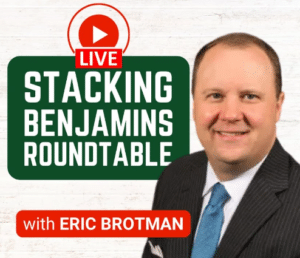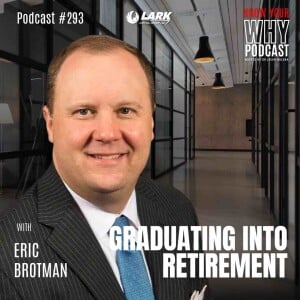Eric Brotman: [00:00:00] This is Eric Brotman, the host of Don’t Retire… Graduate!:The podcast that teaches you how to advance into retirement rather than retreating. Welcome to office hours where we answer listeners’ questions about personal finance, retirement readiness, and more. We received a question from Lou who asked what are some investment strategies that wealthy people keep to themselves?
Eric Brotman: Lou, it’s an interesting question. And I want to approach it two different ways. One is, I think your question is loaded enough to say that wealthy people somehow have secrets that they’re not sharing. And I don’t really think that’s true in most cases. I think in most cases, the only difference between someone who’s already wealthy and someone who aspires to become wealthy is access to information and advice and often access to professionals. But there’s a second way to approach this question. And that is that, uh, under the SEC, there is something called the accredited investor standard that basically says for certain types of investments, you must meet either a net worth [00:01:00] requirement and income requirement or a licensure requirement in order to participate.
Eric Brotman: So, some people are able to invest in various strategies and various vehicles that others are not. So, what does it mean to be an accredited. An accredited investor either means that you have a net worth greater than a million dollars excluding your personal residence, or it means that you have an income personally for the last two years of at least $200,000 or that you and your spouse have joint income of at least $300,000 over the last two years. In terms of licensure for folks who hold their FINRA or sec type licenses and are in the business of financial advising or investment management, they automatically have access to these various things based on the perception that they must have a greater knowledge. And I would argue that people who have gone through the licensing or training do in fact have some additional knowledge, but just because you have a high net worth or a high-income, in my opinion, does not make you a more [00:02:00] savvy investor.
Eric Brotman: In fact, if anything, it can make you. And so the fact that certain types of investments are only available to those folks with high income or high net worth is perceived to be a way to make sure that only sophisticated investors are buying these kinds of private investments. And I don’t know about you Lou, but I’m not sure sophistication and wealth always go hand in hand.
Eric Brotman: Um, and certainly sometimes perhaps, but in other cases, they’re folks who have either inherited money or who’ve who have made a significant amount of. In something other than the investment world. And now they suddenly have access to these types of vehicles that are in fact confusing, complicated, restrictive, and sometimes expensive.
Eric Brotman: So, I don’t think that wealthy people necessarily have secrets. Um, and I certainly don’t think there’s anything sinister there. I do think that wealthy people do things that less wealthy people do. And so this is not so much about the investment strategy, but about the behavior. People who become wealthy, particularly those who become [00:03:00] wealthy themselves tend to have better behavior and better habits around spending and around saving and around earning.
Eric Brotman: So, if your income is greater than your expenses, you have the ability to begin building wealth at whatever level you are. And so, I think starting with the premise that we need to make more than we spend, we need to avoid adverse debt. Some of the basics that that may not sound like a whole lot of fun at a cocktail party, but the reality is there they’re good building blocks for building wealth.
Eric Brotman: Once you reach a certain level of wealth, yes, you absolutely have access to some products and strategies and vehicles that are perhaps not available to you when you’re first getting. But beyond that, once you’ve built a bit of a nest egg, you also have the ability to have professional management, whether that’s a certified financial planner practitioner, whether it’s an investment advisor, whether it’s a private banker or a trust company, or any of these types of entities, there’s certainly a plethora of advice for people who have.[00:04:00]
Eric Brotman: And some would argue that that’s just capitalism. I would argue that it’s a business model and that the business model for financial advisors tends to be, we only want to work with high-net-worth families or high-income families. And the fact is over the last couple of years, we’ve developed at our firm, a financial planning for all model that’s deliberately targeting folks who are up and coming and aren’t necessarily wealthy people yet, but who are ready to build the habits and build the strategies that they’d like to do. So Lou I’d invite you to check out financial planning for all.com and read more about this, because I do think it’s possible for folks who aren’t yet wealthy to get good professional advice and to be able to begin that journey with a co-pilot.
Eric Brotman: So I thank you so much for your question. I hope we helped. If you’d like to send us a question, which we might answer in a future episode of office hours, post it on our Facebook page or tweet us at @BrotmanPlanning. If you like what you hear, please subscribe to our podcast and leave a review on apple podcasts [00:05:00] or wherever you listen to your favorite podcasts.
Eric Brotman: Don’t Retire… Graduate! is a book available in print, Kindle and audio formats, and a workbook with all the exercises you need to help you build your own financial freedom plan. For more information, go to Brotmanmedia.com or buy your copy and leave us a review on Amazon. Please also check out our online financial literacy education courses at BFGuniversity.com.
Eric Brotman: Thanks for coming to office hours. Be sure to tune in for new content every Thursday. For now, this is your host, Eric Brotman reminding you don’t retire, graduate!







